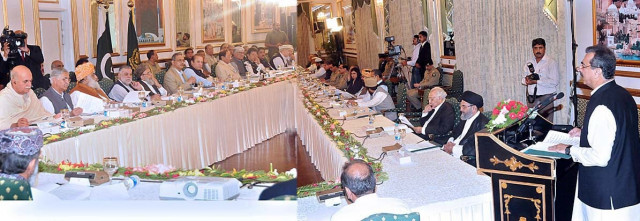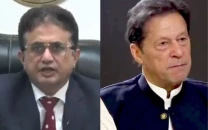Their master’s voice
An APC is not a discussion forum. It is a gathering of the like-minded with pre-determined views.

Their master’s voice
An APC is not a discussion forum. It is a gathering of the like-minded with pre-determined views. The hidden intent of each participant may vary but the overall truth of APCs cannot be ignored, that they are an instrument of the weak: the defiance of the weak against the strong is finally self-damaging. (Prime Minister Junejo’s APC against General Zia climaxed in his own dismissal.) The intent of many parties was to put the PPP on the defensive and prepare the ground for its downfall. The intent of the PPP was to share the damage of the debris falling from a split between the Pakistan Army and America. In a way, the APC is a trophy presented to the military on a platter, a kind of affirmation of its supremacy — and that is precisely what one saw on their television screens on September 29.
The APC is not really aimed at America telling it how the nation is united. Instead, it is a confession on the part of the stakeholders of democracy about their limitations and their internecine relationships that prevent them from uniting against an undemocratic but powerful element in the state. The media is in the midst of another hour which is not its finest because instead of ringing the war drums, it should be ask questions such as what would yet another peace deal with the militants achieve. For now, the media is only playing to, or perhaps fuelling, the rampant anti-Americanism in the country. This is a fever that will only serve to debilitate and undermine the patient.
As for the PML-N, its Nawaz Sharif quite rightly asked that since the whole world was accusing the Pakistani military of helping militants and providing them sanctuaries, there must be some, as he put it, ‘daal mein kala’. The other unspoken signal has come from President Asif Ali Zardari who has remained silent, allowing instead Prime Minister Gilani to articulate the dubious ‘national consensus’ behind the APC. It is now left to ‘small-party’ leaders to say that peace in Afghanistan could be achieved “in a month if the ISI wanted it”. What will be the result of the APC? Its mandated action will not unfold the way that has been visualised, just like the past parliamentary resolutions against drone attacks and talks with terrorists. In the coming days, the Americans will use the drones and none of the corrective action or introspection that is so badly needed for the nation will materialise. Talks with the militants would make sense only if they accepted the system in place in Pakistan and agreed to lay down their arms, but that is not the case because they seek to establish a theocracy, like the Taliban tried to in Afghanistan in the 1990s. We have to ask ourselves whether that is what we want for ourselves? Of course, some of the APC’s participants would say ‘yes’ to this, but what would be the reaction of the mainstream parties?
And then there is also Pakistan’s fragile economy. The APC may arouse ‘ghairat’ as did the joint resolutions of the past but will not be able to do much for the economy. This will not happen because the message of the APC is intensely isolationist and will end up scaring the world. One hopes that an opening sought with India on free trade will not be scuttled by references to Kashmir and that relations with Iran will disarm Tehran about what Pakistan will do next in Afghanistan.
Published in The Express Tribune, October 1st, 2011.



















COMMENTS
Comments are moderated and generally will be posted if they are on-topic and not abusive.
For more information, please see our Comments FAQ